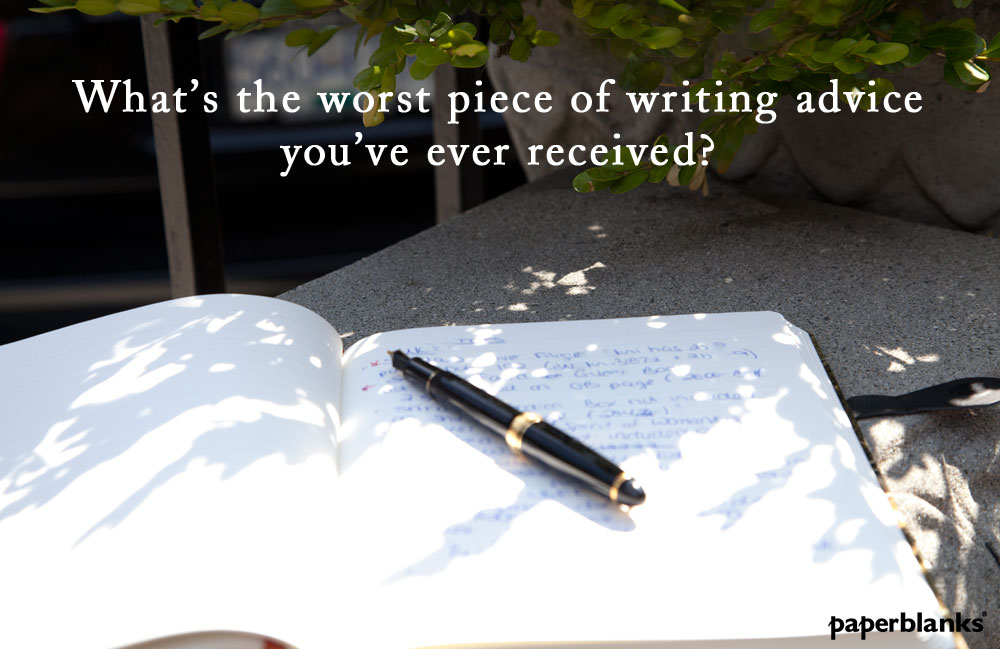It’s easy to look at the works and career of an author whom you admire and wish that you could pick his or her brain for some writing advice. However, what works for one writer doesn’t necessarily work for all, and it’s important not to fall into the trap of accepting the advice of published authors at face value. Often, the uniqueness of the writing styles that make these authors so iconic is the exact reason why you cannot follow their advice and expect to produce the same results. Whether the particular lifestyle of the author you wish to emulate is incompatible with your own, or if their personal success means they cannot possibly understand the trials you are experiencing, there should always be a line of fine print accompanying the advice of a famed writer: “Results may vary.”
Here are a few examples of some famous authors’ most misguided pieces of advice that should actively be avoided, rather than followed.
“If you can tell stories, create characters, devise incidents, and have sincerity and passion, it doesn’t matter a damn how you write.”
– W. Somerset Maugham
While it’s absolutely true that style alone isn’t enough to make up for a lack of content, great content can also be done in by poor style. There are many people in life with vivid imaginations who make for terrible writers – whether their voice is derivative, their subject matter needlessly offensive or their pacing snail-like, not everyone who has an idea can turn it into a well-written story. This isn’t to say that either you have “it” or you should stop trying, but it does mean you shouldn’t expect that your interestingly named character involved in a sincere activity will be enough to sell your story.
“It’s doubtful that anyone with an Internet connection at his workplace is writing good fiction.”
– Jonathan Franzen
The advice here is implied: Don’t be around the Internet if you expect to write effectively. Sure, you don’t want to fall into a procrastination trap or, worse yet, a plagiarism one, but avoiding the Internet in 2014 is near impossible. And why would you? The world wide web is home to thousands of resources for writers, from literary journals to expansive dictionaries to good, old Wikipedia. While you obviously can’t rely on the riches of the Internet to do the writing for you, why deny yourself its possibilities? Writers throughout history have turned to other sources for inspiration and fact-checking; the Internet is simply a hub where you can find all of these resources at once!
“If you already know how the story is going to end, why would you write it in the first place?”
– Carl Hiassen
Hiassen, an accomplished author of Young Adult fiction, says that he subscribes to the Elmore Leonard philosophy of beginning to write without knowing where you’ll be taking the story. Well, this is all fine and good if you are telling a slow burning, coming-of-age novel, but for crafting intricate mysteries or elaborate metaphors, it’s pretty darn important to know the direction of your plot ahead of time. This isn’t to say that you have to remain steadfast and true to a strict pre-outline, but not planning your key events and points can be greatly detrimental when trying to tell a larger story. Just because some authors have the ability to craft a fulfilling yet meandering trip of a story doesn’t mean that the rest of us should expect our own versions not to end up feeling disjointed and episodic.
“Sobriety diminishes, discriminates, and says no, while drunkenness expands, unites, and says yes!”
– Henry James
It should go without saying why this is not a piece of advice for every writer. But, just to reiterate, binge-drinking is dangerous and though writers who followed Henry James’ advice, like Ernest Hemingway and Hunter S. Thompson, are responsible for some of the great pieces of American literature, they also didn’t lead very long, happy or healthy lives.
“Consistency is the last refuge of the unimaginative.”
– Oscar Wilde
While you don’t necessarily want each and every one of your stories to follow the same plot points and star the same characters, consistency does not have to be mutually exclusive with imagination. Having a distinctive voice can be a boon to your writing and help to create a memorable story that draws readers back for more. Similarly, having the same characters pop up across multiple novels (think James Joyce’s Stephen Dedalus) can help to link the individual story arcs within a larger narrative and worldview. Striving to create an original and surprising piece of work every time you write is an important goal, but this doesn’t necessarily have to be at the expense of creating some sort of consistent writing style.
“Don’t Try.”
– Charles Bukowski
It may not be very “cool” of a counterculture author like Charles Bukowski to admit to trying too hard, but for anyone who’s read his semi-autobiographical Factotum, the true scale of Bukowski’s “trying” is revealed. He spent years sending manuscript after manuscript to various publications, and though he eventually earned acclaim as a “laureate of American lowlife,” it certainly wasn’t for lack of effort. As with any pursuit, effort is an inherent part of the creative process and while it would be wonderful to always have fabulous and fully crafted stories flow easily, this is not always going to be the case. So try, and try again, and as you hone your skills and grow your literary network, your writing (and chances for success) will only improve.






Very good and “needed” blog. When I read the “advice” of published authors regarding writing, I view it more as insights they have had with regard to addressing their own personal Achilles heels. rather than as guidelines for others. And, I try to understand the principles that underlie their statements. I think that each
writer attempts to identify some aspects of the creative process. . . and sometimes I think that they err in implying that there is only one element to that process.
Hi Stacey,
I think that’s absolutely correct. Once an author as “made it” it’s easy for him or her to reflect back on their personal journey, but hard to separate themselves and look objectively at the writing process. Sometimes the best is advice is not listen to advice, at all!
Cheers,
The Paperblanks® Team